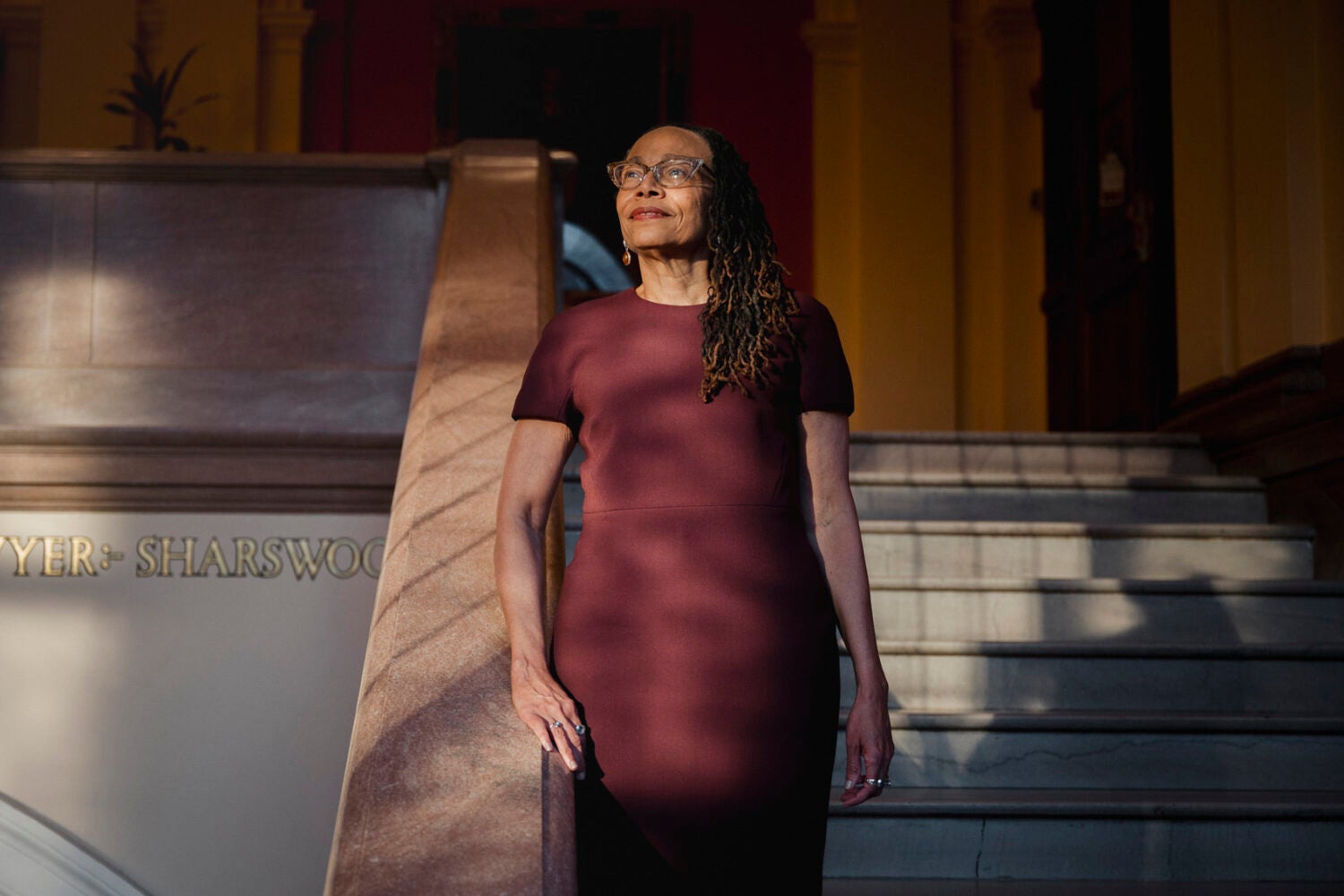Dorothy E. Roberts ’80 isn’t interested in compromise, bargains, or the status quo. She is interested in sweeping social change and has devoted her career to pushing for it, using her scholarship to challenge systems she views as inherently unjust, such as those governing child welfare.
“We need to radically change how we think about child safety and welfare, and that means we need to focus on supporting families,” says Roberts, author of the 2022 book “Torn Apart: How the Child Welfare System Destroys Black Families — and How Abolition Can Build a Safer World.” She adds, “Our society could be structured in a way to provide for those families’ material needs, but instead, it unleashes this terrorizing system on them.”
Through her teaching, research, and writing, Roberts has pressed for change for almost four decades by exposing racism and inequities that she sees in child welfare, medicine, women’s reproductive rights, and criminal justice. A professor of law, Africana studies, and sociology at the University of Pennsylvania, she has written four books and many influential articles. She has received a range of honors, including a 2024 MacArthur Fellowship in recognition of her lifelong work devoted to uplifting others.
A long evolution
“We need to change the whole logic of child welfare away from this accusatorial, punitive system.”
If you ask Roberts about the origins of her uncompromising approach, she points back to her clerkship for Judge Constance Baker Motley of the U.S. District Court for the Southern District of New York. The year was 1980, and Motley had asked Roberts, a newly minted Harvard J.D., to draft an opinion for a case involving two New York teenagers eager to marry without parental consent. The Supreme Court’s 1973 landmark decision Roe v. Wade establishing a constitutional right to an abortion was on Roberts’ mind as she wrote, and she was certain that if the teenagers’ case made its way to the federal appeals court, the judges would build on that ruling in a way that would vindicate their right to marry. But Motley, a civil rights strategist and the first Black woman to argue before the high court, thought otherwise. After reading her young clerk’s argument, Motley responded with three simple words: “Are you serious?”
Motley explained that Roberts’ reasoning, however well intentioned, was too much of a stretch under prevailing doctrine, which meant that the 2nd Circuit Court of Appeals would almost certainly reverse a decision adopting it. For Roberts, it was a sharp lesson on the allocation of power in our federal legal system, the broad authority enjoyed by states to regulate families, and the temperament required to make hard legal calls from the bench.
“Judge Motley came at it from a greater understanding of how the law actually operates, and I had a very idealistic view,” recalls Roberts. “I learned that as a judge you have constraints that you don’t have as an activist or as a legal advocate for your client, or even as a professor who’s not only writing about how the law works but trying to present a vision of how the law could change.”
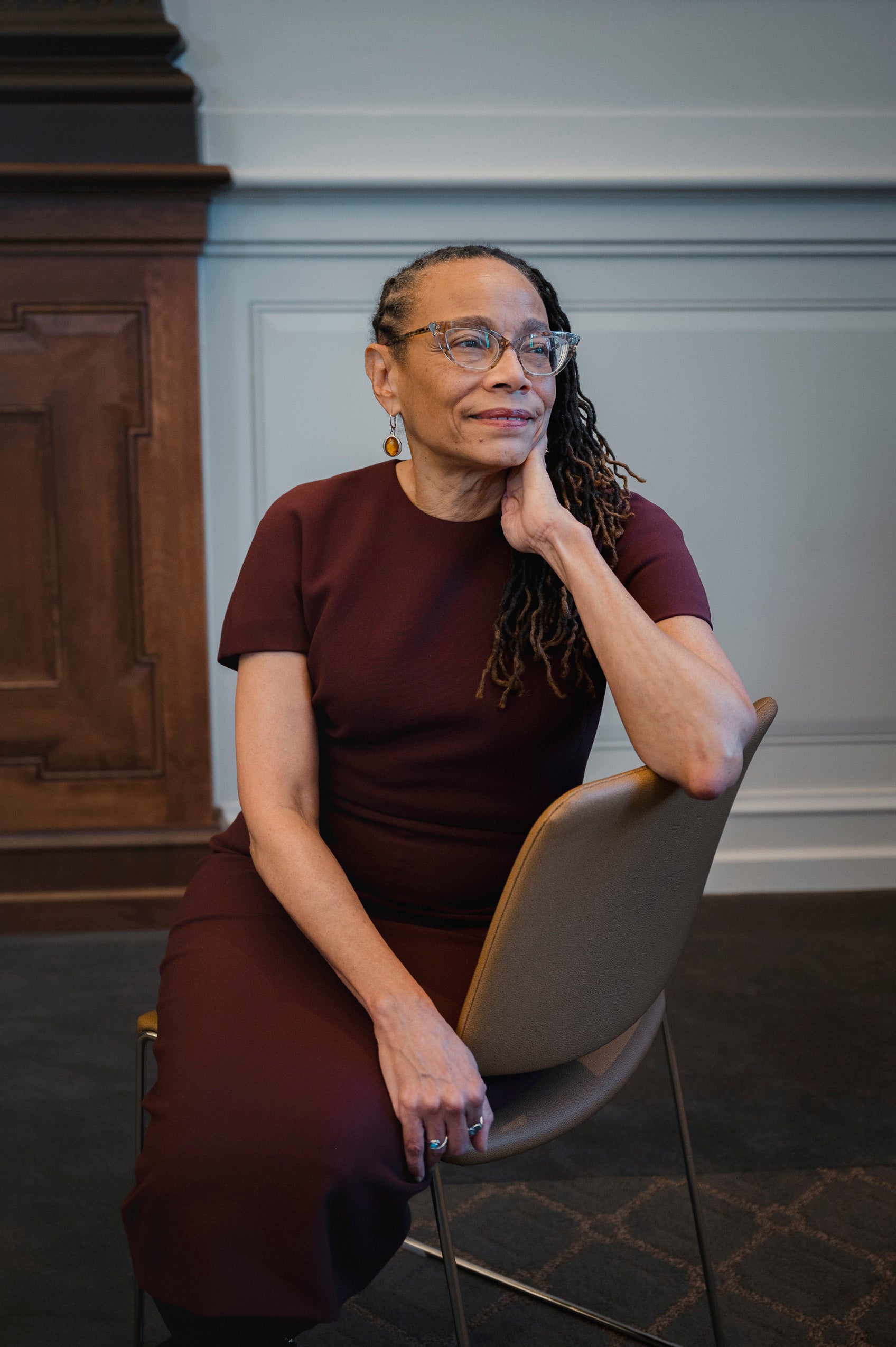
Yet Roberts never stopped believing that to make a difference, she would need to push back. In the end, she found that a classroom, not a courtroom, was the best home for her ideas. “I realized that I would rather do academic research and writing and teaching,” she says, “because I wanted to be able to make a case for change. I wanted to be an advocate, I wanted to be a visionary, and I didn’t want my vision to be constrained by the confines of the law as it stands.”
A natural progression
Roberts’ path to activism began in 1960s Chicago on the city’s South Side. In school, she took part in discussions about civil rights. Outside of class, she routinely gathered with family and friends at a local church to support civil rights activists or to join marches for racial justice or against the Vietnam War. At home, she learned “all human beings are equal and should be valued equally.”
“I was raised by my parents, but also by the whole community, to feel that I had an obligation to be involved in doing work for social justice. That had a huge impact on my life.”
“I was raised by my parents, but also by the whole community, to feel that I had an obligation to be involved in doing work for social justice,” says Roberts. “That had a huge impact on my life, on my sense of a moral responsibility to work in some way to make our society more just and equitable.”
Roberts also watched her parents push for change in their personal and professional lives. Her father, an anthropology professor, was white, and her mother, who was from Jamaica, was Black. They met at Roosevelt University in Chicago, where she was his student, and together they would focus on interracial marriage in their scholarship, examining its relationship to what her father called the nation’s “racial caste system.”
“From my parents I learned that there are no biological differences, no natural reason why there needed to be racial segregation,” says Roberts. “That lesson still lives with me today.”
After she studied anthropology at Yale, Roberts’ interest in social justice led her to focus on law and apply to Harvard. “I felt Harvard was the best place to learn about lawyers’ involvement in social activism and policy,” she recalls. In Cambridge, she learned both in class and by working with the school’s Legal Aid Bureau, representing underserved clients.
“I was just so grateful that I could get that kind of exposure and experience early on,” she says.
A significant move
After Harvard, Roberts clerked for Judge Motley, and then she headed to a firm. It was while working for Paul, Weiss in New York City that she heard of Angela Carder, a pregnant woman dying of cancer who was required under court order to have a cesarean section. The baby died shortly after the procedure. Carder died two days later. A mother of three young children, Roberts was outraged.
“That was the beginning of my thinking about how pregnancy could be the basis for denying people’s rights and allowing the state to interfere with their autonomy and their bodies.” Not long after, she shifted to academia, taking a teaching job at Rutgers in 1988. In May 1991, she published a seminal article in the Harvard Law Review titled “Punishing Drug Addicts Who Have Babies: Women of Color, Equality, and the Right of Privacy.”
“I felt Harvard was the best place to learn about lawyers’ involvement in social activism and policy.”
“I suspected that these were Black women who were being treated this way, and I looked at it as … a public health issue that was turned into a crime,” says Roberts, who argued that such prosecutions violated the Constitution’s 14th Amendment by both discriminating against the women on the basis of race and denying their right to privacy.
Many colleagues encouraged her to wait to take on such an “unusual topic” until she had tenure. True to form, Roberts held her ground.
“I thought the test for constitutional jurisprudence shouldn’t be whether the Constitution protects the most privileged people. It should be whether the Constitution protects the dignity and equality of the least privileged, the most marginalized people. That was my motivation, and publishing that article was a vindication of my principles and my passions.”
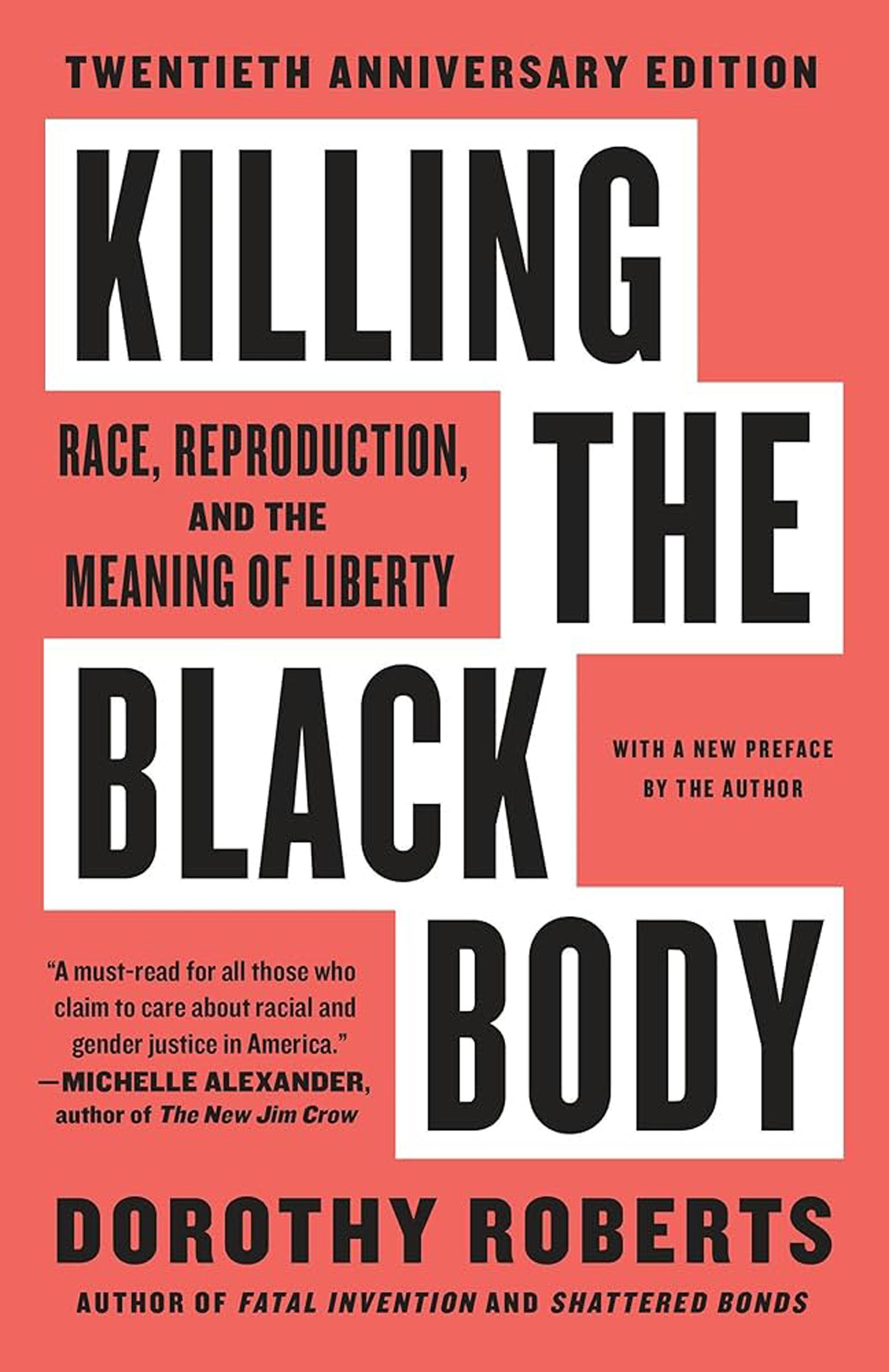
That work was a launching pad, leading her to study the many ways in which Black women’s childbearing has been devalued throughout time and inspiring her first book, “Killing the Black Body: Race, Reproduction, and the Meaning of Liberty,” published in 1997, which examines the history of reproductive oppression.
Her second book was informed by the long hours she’d spent in child welfare hearings in Chicago, watching, listening, and learning. “All the families I saw there whose children had been taken from them were Black families, every single one,” says Roberts. “It was so obvious that this system was targeting them.”
She began to investigate, finding that Black children were four times more likely to be taken from their families by Child Protective Services and placed in foster care than white children were, and that Black children were the largest group in the foster care system. She published the book “Shattered Bonds: The Color of Child Welfare” in 2001.
For the next several years, Roberts worked directly on child welfare reform policy with foundations, government agencies, and law firms. Yet she gradually realized that despite her best efforts, the problem “could not be fixed,” and that true change required more fundamental reform. She lays out that vision in “Torn Apart,” outlining the harms caused by the child welfare system and calling for it to be dismantled and replaced “with more caring and supportive ways of addressing children’s needs and the needs of their families.”
In the book, Roberts argues that direct cash payments and better health care, housing, food, and community supports could radically improve the outcome for parents who are too often charged with child neglect when the real problem they are struggling with is poverty. Relying on child removal masks the structural reasons for children’s unmet needs, she says, hindering more effective and humane social change.
“We need to change the whole logic of child welfare away from this accusatorial, punitive system toward voluntary, generous, caring supports for families based in their communities,” she says. “I think that would both provide what families need to care for their children and, again, radically decrease what we think of as child maltreatment.”
In her writing, Roberts repeatedly makes the case that people with privilege and wealth are shielded from what she calls “the family policing system,” at one point using herself as an example. In “Torn Apart” she describes how her young son’s teacher had threatened to send a truancy officer to her house because he had missed days of school. (He was with his mother, who was traveling to lecture abroad.) The teacher’s attitude changed when she discovered Roberts taught at Northwestern. “I was exempted from the terror of this system,” says Roberts, “because I had the privilege of being a university professor.”
Sweeping range of concerns
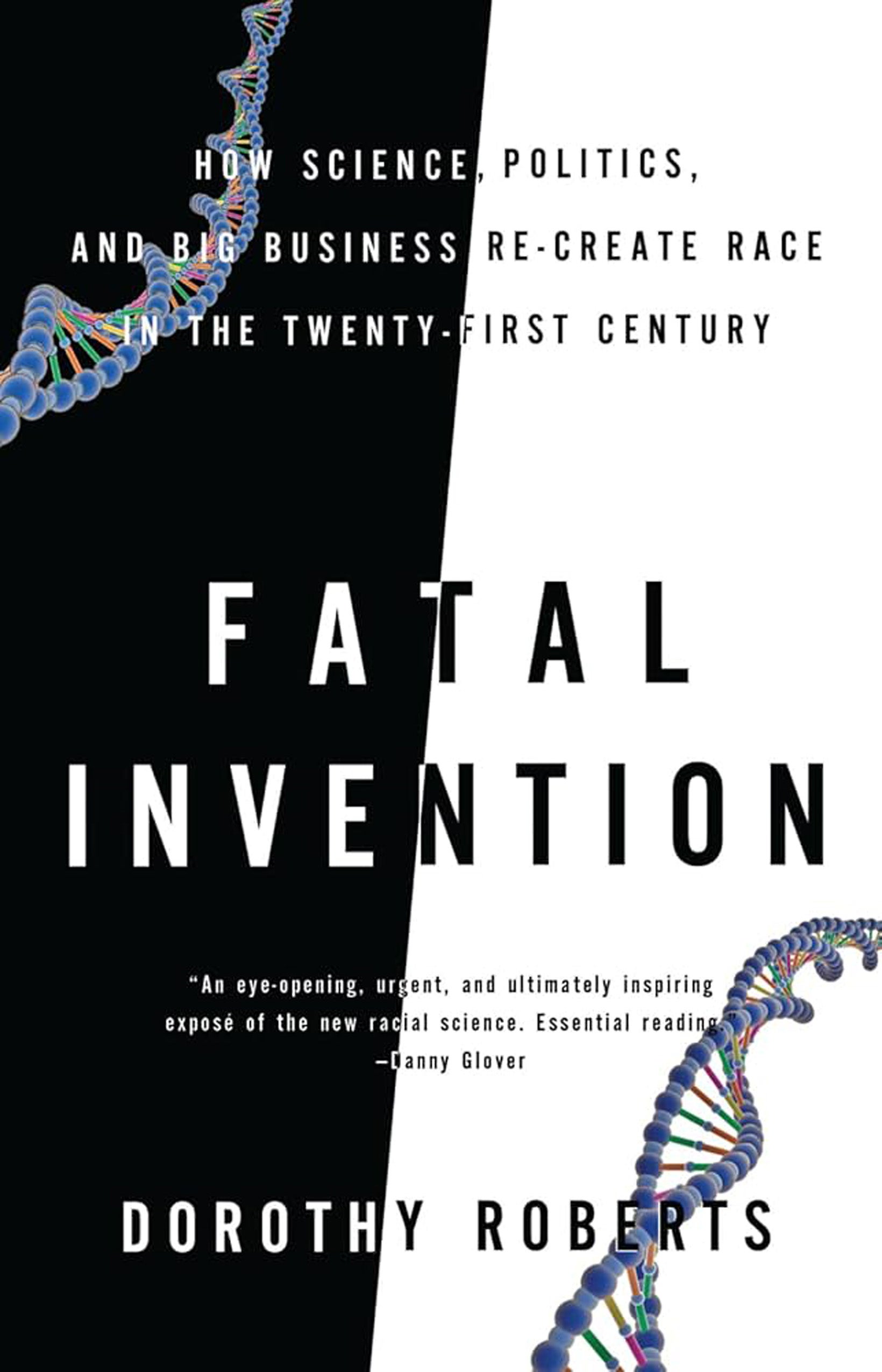
Roberts’ work on racism is wide-ranging and often has focused on inequities in science and medicine. She has written about the role of medical schools in propagating physician bias, the debate involving colorblind COVID-19 ventilator allocation, and the prevalence of race-based medicine.
In her 2011 book, “Fatal Invention: How Science, Politics, and Big Business Re-create Race in the Twenty-first Century,” she takes on the myth of race as a biological concept. And in a 2015 TED talk, viewed more than 1.6 million times, Roberts highlights how race is used in medicine to diagnose, treat, and even define diseases. She describes a heart medicine that was marketed specifically to Black patients, and she explains how many doctors were still using a diagnostic tool developed during the slavery era to gauge lung capacity based on the faulty assumption that Black people have lower capacity than whites.
“The focus on innate racial differences in disease diverts attention and resources from the social determinants that cause appalling racial gaps in health: lack of access to high-quality medical care, food deserts in poor neighborhoods, exposure to environmental toxins, high rates of incarceration, and experiencing the stress of racial discrimination,” Roberts told her audience. “Race medicine is bad medicine. It’s poor science, and it’s a false interpretation of humanity.”
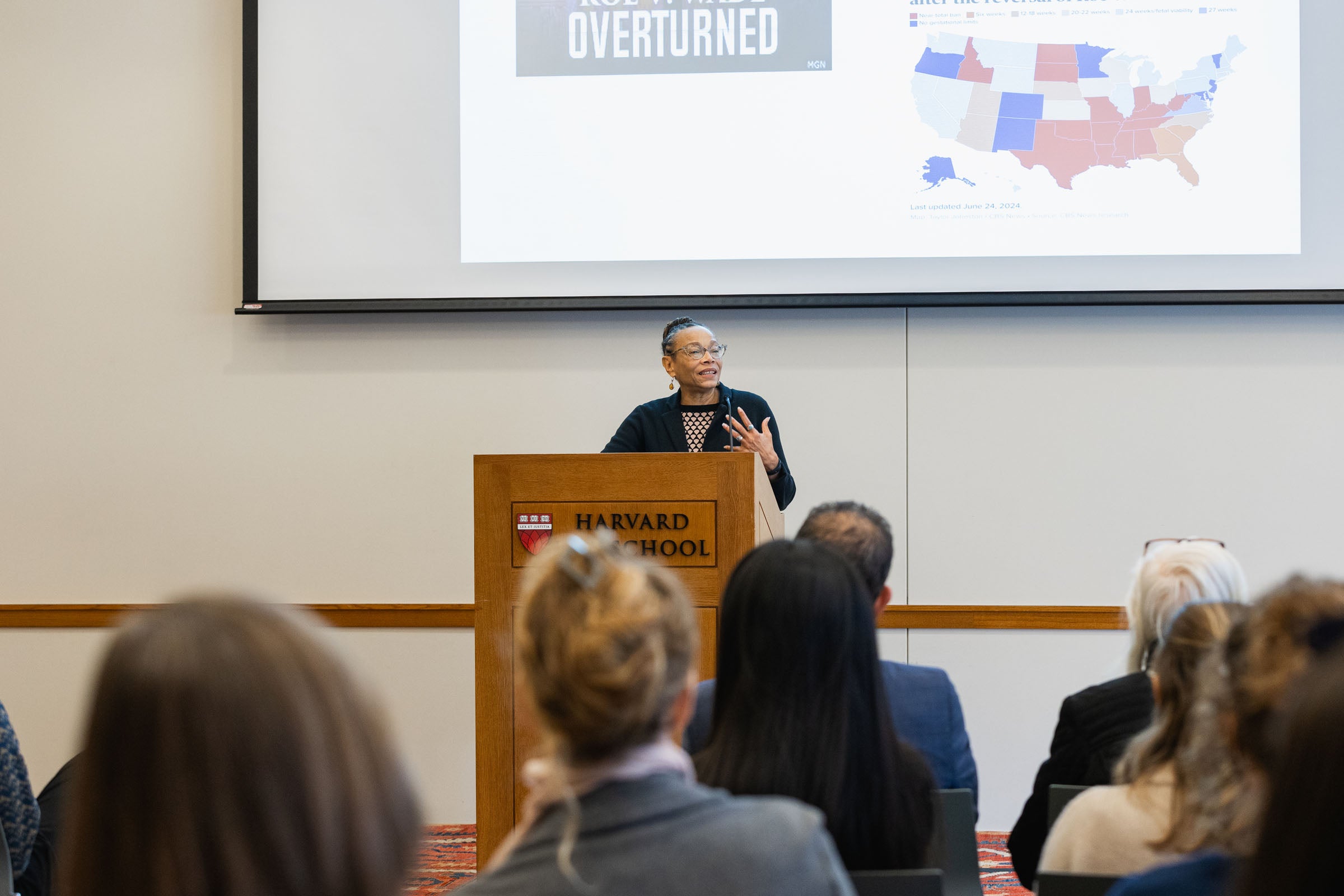
A generous genius
It seems that lifting people up is written into Roberts’ DNA. When a MacArthur representative emailed her last fall about an evaluation she had provided for another nominee, Roberts immediately got in touch, eager to help. On the phone, she was informed that in fact she had been selected for the prestigious fellowship.
“If others hadn’t been on the call, I would have immediately burst out crying,” Roberts recalls. “I realized it was going to bring attention to the families, and I have been working so hard to get their voices heard.”
“I come from the position that we have to end structural racism for there to even be the possibility of truly respectful interracial long-term relationships.”
Unsurprisingly, she is planning to use her $800,000 cash prize to continue fighting for those in need. “I have ideas about how to make it useful for continuing the work I’m doing to end family policing,” says Roberts, “and more broadly to end the carceral approach to human needs that is so ubiquitous and prevalent in our society.”
But first, Roberts is finishing up a different type of writing project, a memoir that examines her relationship to her father’s research, specifically his unfinished manuscript on interracial marriage. The book will explore the impact of his scholarship on her own thinking and the ways in which their ideas diverged.
He believed that “a committed relationship with someone from another race could have a significant impact on racial inequality,” says Roberts, who pored over 25 boxes of her father’s papers, including hundreds of transcripts of his interviews with interracial couples, before she began writing. Her book delves into how her philosophy evolved.
“I come from the position that we have to end structural racism for there to even be the possibility of truly respectful interracial long-term relationships in any significant numbers,” she says. “As I work on my memoir, I’m trying to figure out this debate that I had with my father throughout my adolescence and adulthood, and I’m thinking about the question, What does it mean to truly love each other in a racist society?”
